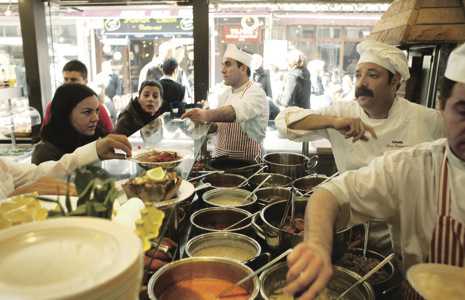
Musa Dağdeviren (right) in the kitchen at his restaurant Çiya Sofrasi. Photograph by Carolyn Drake.
To get to the restaurant Çiya Sofrasi from the old city of Istanbul, you take a twenty-minute ferry ride to the Asian side of the Bosporus. On a cold Monday night last November, a friend persuaded me to make the trip with him. The place was pleasant but unremarkable, with a gray tiled floor, wooden tables, and no tablecloths or printed menus. There was a self-service bar with meze priced by weight. Hot dishes were dispensed at a cafeteria-style counter by a hatchet-faced man in a chef’s hat.
The first sign of anything unusual was the kisir, a Turkish version of tabouli, which had an indescribable freshness and suddenly reminded you that wheat is a plant. The bitter edge of sumac and pomegranate extract, the tang of tomato paste, and the warmth of cumin, which people from the south of Turkey put in everything, recalled to me, with preternatural vividness, the kisir that my aunt used to make. Likewise, the stewed eggplant dolmas resembled my grandmother’s version even more intensely, somehow, than those dolmas resembled themselves.
Food, I should clarify, has never played a large role in my mental life. I enjoy a good meal as much as anyone, but I get so confused by nutritional, budgetary, ecological, ethical, aesthetic, and time-management concerns that I often subsist for weeks on instant oatmeal and multivitamins. Having read Proust, and also neuroscientists on the direct connection from smell and taste receptors to the hippocampus, I have long been aware that eating is, for many people, an emotionally and mnemonically fraught activity. But, that night at Çiya, I viscerally understood why someone might use a madeleine dipped in tea as a metaphor for the spiritual content of the material world.
Overwhelmed by the kisir and the dolmas, I wondered if the explanation lay in my past. Both my parents were born in Turkey, but I hadn’t been back for more than four years. I hadn’t gone to my grandmother’s funeral; I had been holed up in my apartment in San Francisco, writing a dissertation chapter about Proust—Proust, who wrote so movingly about losing a grandmother! Now, belatedly returning to my parents’ homeland, I found myself not on the Black Sea, where my grandmother was born and buried, or in Ankara, where she lived, or in my father’s home city of Adana, where my aunt still lives. Instead, I had come to Istanbul, a city with which I had many romantic associations but little practical experience. Perhaps the meze reminded me of an irretrievable time when my aunt and my grandmother had cooked for me, and I had been where I was supposed to be in the world.
As the meal progressed, the tastes grew stronger and more varied. One inscrutable salad contained no recognizable ingredient except jewel-like pomegranate kernels, nestled among seaweed-colored, twig-shaped objects and mysterious chopped herbs, nutty and slightly bitter. A stew uniting beef, roasted chestnuts, quince, and dried apricots in an enigmatic greenish broth tugged at some multilayered memory involving my mother’s quince compote. I kept looking around the room for some clue to what was happening. Half the tables were empty; near us sat a few Turkish families, a handful of lone diners with books, and two Italian backpackers. There were some restaurant reviews on the walls, and a portrait of Atatürk, and a shelf with a row of jars bearing handwritten labels—“Dried Quince,” “Pickled Deer-Mushrooms,” and many terms I didn’t recognize, which I copied into a notebook.
via Musa Dagdeviren recovers foods that Turkey forgot : The New Yorker.
more: https://www.newyorker.com/magazine/2010/04/19/the-memory-kitchen